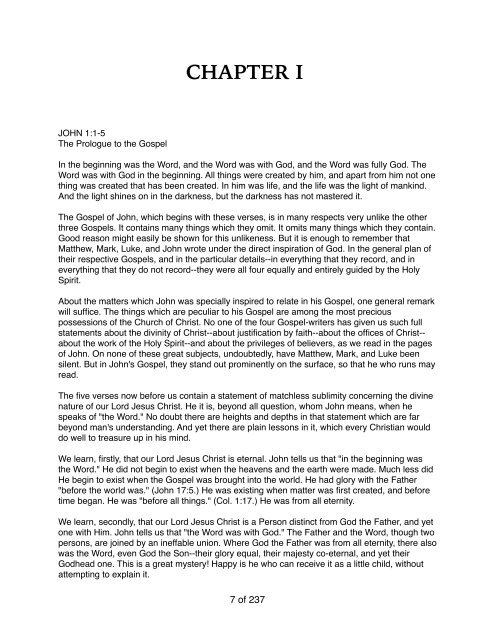J. C. Ryle John
John Charles Ryle (May 10, 1816 - June 10, 1900) was an evangelical Anglican clergyman and first Bishop of Liverpool. He was renowned for his powerful preaching and extensive tracts.
John Charles Ryle (May 10, 1816 - June 10, 1900) was an evangelical Anglican clergyman and first Bishop of Liverpool. He was renowned for his powerful preaching and extensive tracts.
You also want an ePaper? Increase the reach of your titles
YUMPU automatically turns print PDFs into web optimized ePapers that Google loves.
CHAPTER I<br />
JOHN 1:1-5<br />
The Prologue to the Gospel<br />
In the beginning was the Word, and the Word was with God, and the Word was fully God. The<br />
Word was with God in the beginning. All things were created by him, and apart from him not one<br />
thing was created that has been created. In him was life, and the life was the light of mankind.<br />
And the light shines on in the darkness, but the darkness has not mastered it.<br />
The Gospel of <strong>John</strong>, which begins with these verses, is in many respects very unlike the other<br />
three Gospels. It contains many things which they omit. It omits many things which they contain.<br />
Good reason might easily be shown for this unlikeness. But it is enough to remember that<br />
Matthew, Mark, Luke, and <strong>John</strong> wrote under the direct inspiration of God. In the general plan of<br />
their respective Gospels, and in the particular details--in everything that they record, and in<br />
everything that they do not record--they were all four equally and entirely guided by the Holy<br />
Spirit.<br />
About the matters which <strong>John</strong> was specially inspired to relate in his Gospel, one general remark<br />
will suffice. The things which are peculiar to his Gospel are among the most precious<br />
possessions of the Church of Christ. No one of the four Gospel-writers has given us such full<br />
statements about the divinity of Christ--about justification by faith--about the offices of Christ--<br />
about the work of the Holy Spirit--and about the privileges of believers, as we read in the pages<br />
of <strong>John</strong>. On none of these great subjects, undoubtedly, have Matthew, Mark, and Luke been<br />
silent. But in <strong>John</strong>'s Gospel, they stand out prominently on the surface, so that he who runs may<br />
read.<br />
The five verses now before us contain a statement of matchless sublimity concerning the divine<br />
nature of our Lord Jesus Christ. He it is, beyond all question, whom <strong>John</strong> means, when he<br />
speaks of "the Word." No doubt there are heights and depths in that statement which are far<br />
beyond man's understanding. And yet there are plain lessons in it, which every Christian would<br />
do well to treasure up in his mind.<br />
We learn, firstly, that our Lord Jesus Christ is eternal. <strong>John</strong> tells us that "in the beginning was<br />
the Word." He did not begin to exist when the heavens and the earth were made. Much less did<br />
He begin to exist when the Gospel was brought into the world. He had glory with the Father<br />
"before the world was." (<strong>John</strong> 17:5.) He was existing when matter was first created, and before<br />
time began. He was "before all things." (Col. 1:17.) He was from all eternity.<br />
We learn, secondly, that our Lord Jesus Christ is a Person distinct from God the Father, and yet<br />
one with Him. <strong>John</strong> tells us that "the Word was with God." The Father and the Word, though two<br />
persons, are joined by an ineffable union. Where God the Father was from all eternity, there also<br />
was the Word, even God the Son--their glory equal, their majesty co-eternal, and yet their<br />
Godhead one. This is a great mystery! Happy is he who can receive it as a little child, without<br />
attempting to explain it.<br />
7 of 237




